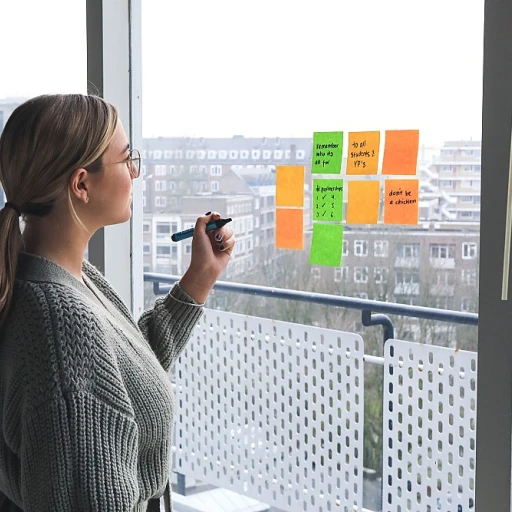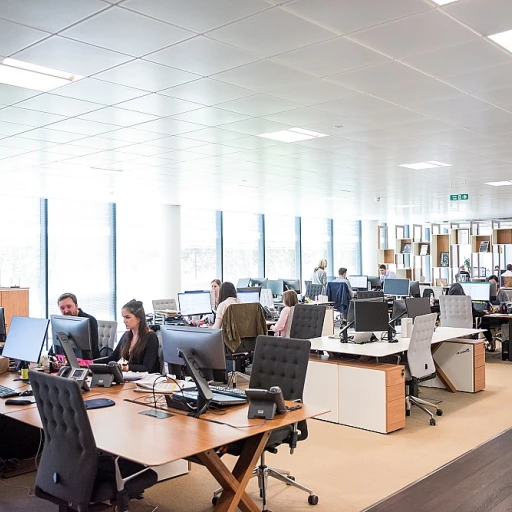Understanding Growth vs. Fixed Mindsets
Distinguishing Between Two Key Mindsets
It's crucial to start by understanding the distinction between growth and fixed mindsets. Coined by psychologist Carol Dweck, these terms refer to different beliefs individuals hold about their abilities. A fixed mindset posits that intelligence and talents are static and unchangeable, leading to a tendency to avoid challenges and give up easily. In contrast, a growth mindset embodies the belief that abilities can be developed through dedication and hard work.
Acknowledging this fundamental difference is the first step toward embracing and nurturing a growth mindset. Unlike those with a fixed mindset, individuals who adopt a growth mentality see challenges as opportunities to enhance their skills and knowledge. They understand that failure is not a reflection of their capabilities, but rather a learning experience that fuels personal and professional development.
By fostering a growth mindset, individuals are more likely to pursue lifelong learning and personal development. This mindset shift can have profound implications in both personal and professional realms, allowing individuals to explore their inherent potential. Cultivating such an environment isn't limited to individuals alone; organizations can greatly benefit by
developing a culture of continuous learning, encouraging employees to embrace growth and flexibility.
The Role of Effort and Hard Work
The Power of Perseverance and Consistent Effort
When we talk about nurturing a mindset conducive to growth, it's crucial to emphasize the significance of effort and perseverance. Unlike a fixed mindset, which often shies away from challenges, a growth-oriented approach recognizes that talent and intelligence can be developed over time with dedication and hard work.
The importance of effort is not just about working harder but also about working smarter. It’s about embracing mistakes as opportunities to learn, and, most importantly, not giving up when the path gets tough. This aligns beautifully with the acknowledgment that "continuous effort not strength or intelligence is the key to unlocking our potential." This understanding is the cornerstone that supports the mindset shift from fixed to growth, enabling individuals to thrive in various aspects of their lives.
Embracing the Challenge of Skill Building
The process of consistently putting in effort must also involve strategic actions geared towards skill enhancement. This can pertain to building new competencies or honing existing ones. The journey is equally significant as the destination since it involves critical thinking, experimentation, and eventual mastery.
For individuals and organizations alike, skill development is a powerful engine driving progress. In the workplace, especially, the ability to adapt through continuous learning can be transformative. Investing effort to cultivate both soft and technical skills positions one at an advantage, making them indispensable assets to their organizations. For more insights into how this ongoing learning can propel workplace success, consider exploring
continuous learning strategies that significantly impact personal and professional growth.
Perseverance and hard work are tools that anyone can harness to propel themselves towards their objectives, regardless of the challenges they face. This tenacity nurtures not only a resilient mindset but also a refined capability to navigate the complexities of ever-changing environments.
Feedback: A Catalyst for Personal Development
In the process of nurturing a growth mindset, feedback stands as a vital component, serving as a springboard for personal development. Unlike the fixed mindset, which views feedback as a threat or a critique of one's inherent abilities, the growth mindset interprets feedback as a valuable resource for improvement and growth.
Feedback, whether positive or constructive, provides insights into our current level of performance, highlighting areas that are strong and others that require further attention. This enables individuals to make informed decisions about their learning paths, pushing them to reach new heights of personal and professional development. With a growth mindset, feedback is not just accepted but actually sought out as an opportunity to gain clarity on how one can improve.
Embracing feedback is essential for continuous learning. It encourages a culture where individuals are more open to experimenting, taking risks, and stepping beyond their comfort zones – fundamental aspects discussed earlier in fostering a
true learning culture. Feedback fosters resilience and adaptability, attributes crucial in today’s fast-paced world. It’s not merely about accepting criticism; it’s about viewing each piece of feedback as a chance to evolve.
Ultimately, developing a growth mindset involves constant self-reflection and the willingness to adapt based on feedback received. This attitude transforms challenges into opportunities for learning and sparks a relentless pursuit of mastery in any given field. By altering how we perceive and react to feedback, we harness its power, turning it into a strategic tool for success.
Overcoming the Comfort Zone
Stepping Outside Your Comfort Zone
Embracing a growth mindset often requires us to make a conscious decision to step outside our comfort zones. This can be challenging because comfort zones are, by nature, safe and predictable. However, true growth occurs when we push the boundaries of what feels comfortable and venture into the unknown.
Taking this leap requires an understanding that discomfort is part of the growth process. It's essential to recognize that feeling uneasy or uncertain is not a sign of failure but rather an indication that you are expanding your capabilities. Consider this: every significant achievement in history has been the result of someone daring to go beyond their safe spaces.
In previous discussions, we've highlighted the importance of effort and hard work. These components become even more critical when navigating uncharted territories. The role of continuous perseverance cannot be understated, as setbacks and challenges along the way will test your resolve.
Furthermore, creating a safe environment for experimentation is crucial. This means fostering a mindset that views failure as a learning opportunity rather than a detriment. By doing so, you reduce the fear associated with making mistakes and instead focus on the lessons learned. This ties back to the earlier section discussing the impact of feedback and how it can serve as a catalyst for growth.
Venturing beyond your comfort zone is an exercise in resilience and adaptability. It prepares you to handle future challenges with confidence and equips you with the tools needed for personal and professional growth. Embrace the adventure of stepping into new areas, and you'll likely find that the world has much to offer beyond the walls of comfort.
The Impact of Carol Dweck's Research
The Influence of Carol Dweck's Research on Mindset Development
Carol Dweck's pioneering research has sparked a revolution in understanding how our beliefs about abilities shape our approach to challenges, efforts, and ultimately, our success. Her theory on growth versus fixed mindsets is vital in comprehending how adopting the right mindset can fuel personal and professional development.
Dweck's work emphasizes that those with a growth mindset believe abilities and intelligence can be developed with dedication and hard work. This contrasts with a fixed mindset, where individuals perceive their talents as static traits they cannot change. Her findings, therefore, invite us to reassess how we perceive failure and success, urging us to embrace challenges as opportunities to learn and grow rather than threats to our self-worth.
The impact of Dweck's research extends into various realms, from education to business and personal development. Her insights have encouraged educators to foster environments where students view mistakes as learning pathways. In organizations, leaders armed with these principles invest in creating a culture that champion learning and resilience.
Understanding Dweck's contributions can profoundly affect how individuals tackle obstacles and strive towards self-improvement. By recognizing the importance of mindset, individuals are better equipped to leverage the principles of effort and hard work discussed earlier, while also decisively moving beyond their comfort zones to embrace new learning opportunities.
Practical Tips for Developing a Growth Mindset
Implementing Strategies to Cultivate a Growth-Oriented Mindset
Transitioning from a fixed mindset to a growth-oriented one requires commitment, practice, and patience. Here are some practical strategies that can aid in developing this adaptable approach to life and challenges:
Start With Self-Reflection: The journey begins by assessing one's current mindset. Reflective practices such as journaling your thoughts, experiences, and reactions to setbacks can provide valuable insights into your mindset orientation. This awareness is the critical first step in nurturing growth.
Embrace Challenges as Learning Opportunities: Instead of avoiding difficult tasks, view them as opportunities for development. Approach challenges with curiosity and a willingness to learn. This shift in perspective allows you to see the potential in overcoming obstacles, connecting with the principles discussed about effort and hard work.
Adopt a Love for Learning: Emulate lifelong learners who demonstrate an innate desire to improve and explore. Whether it's acquiring new skills, deepening existing knowledge, or embarking on unfamiliar ventures, fueling a passion for learning can significantly boost your growth mindset.
Seek Constructive Feedback: Feedback provides a unique opportunity for improvement and self-assessment. Actively seek input from peers, mentors, or leaders to gain different perspectives and constructive criticism. Use feedback as a stepping stone for personal and professional enhancement.
Cultivate Resilience and Perseverance: Resilience is key in the growth mindset. When faced with setbacks, reinforce your determination to persist. Understand that failure is a natural part of the learning journey, not a terminal point. Building resilience enables you to bounce back stronger and stay committed to your goals.
Practice Gratitude and Positivity: Maintaining a positive outlook can help reinforce growth-oriented thinking. Practice gratitude by recognizing and valuing the small victories and the progress you've made, regardless of their size. Positivity nurtures motivation and reinforces a mindset geared toward growth.
Remember, developing a growth mindset is an ongoing process that intertwines with various aspects of life. By continually working on these strategies, you enable yourself to embrace the journey of learning and growth with openness and enthusiasm.












